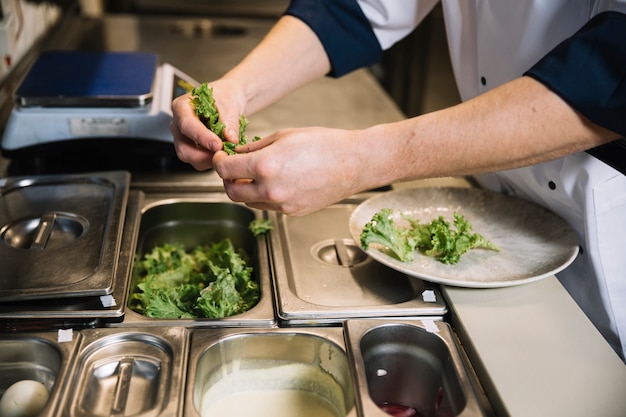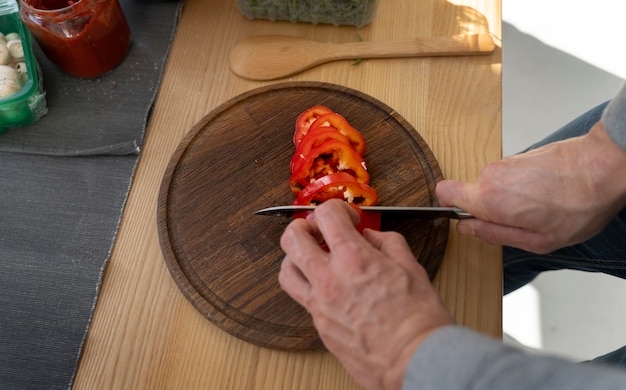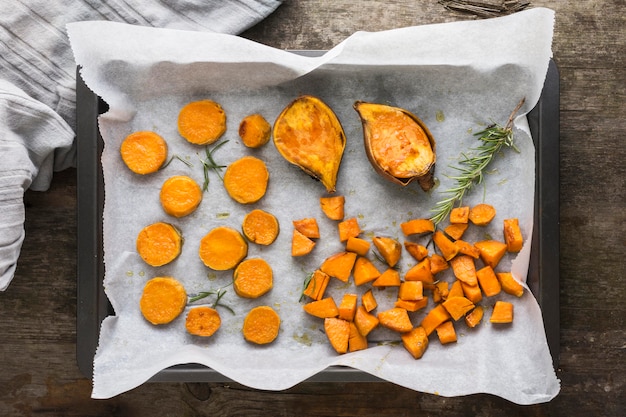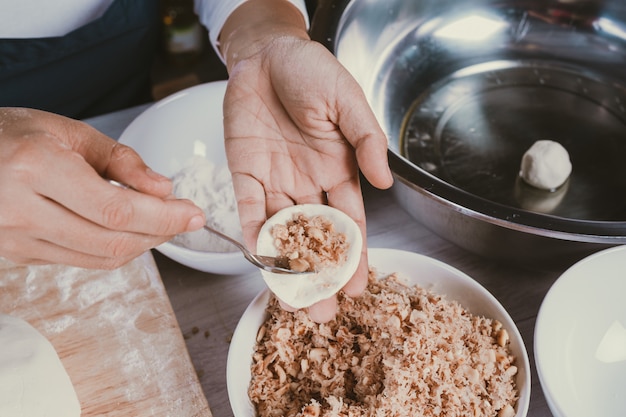Let's be honest, there's something about a perfectly cooked ny strip steak that just makes you feel like a culinary rockstar. That beautiful marbling, the juicy tenderness, and that mouthwatering sear – it's all just pure steak heaven. But here’s the thing: you don’t need a fancy grill or years of experience to get that perfect steak. I’m here to tell you that you can absolutely nail it on your stovetop, and I’ll show you how.
I remember my first attempt at cooking a steak. Let’s just say it wasn’t pretty. It was tough, dry, and definitely not something I’d want to repeat. But over the years, I’ve learned from my mistakes and mastered the art of the stovetop steak. And now I’m ready to share all my secrets with you. We’re going to cover everything from picking the right cut to achieving that perfect sear, and we’ll even delve into the world of sauces and sides. So, grab your favorite skillet and let’s get cooking!
Part 1: choosing the right cut

The first step to any successful steak journey is selecting the right cut. You want a NY Strip, also known as a new york strip or a Kansas City Strip. It’s a cut from the short loin, just behind the rib, known for its great marbling, which is that lovely white fat that gives the steak its incredible juiciness and flavor. But how do you pick the perfect one? Here's what to look for:
What to Look For in Your NY Strip Steak
- Marbling: Think of marbling as the steak's secret weapon. Those white streaks of fat running through the muscle are what give the steak its rich flavor and tenderness. Look for steaks with a good amount of marbling, but not too much. You don't want it to be overwhelmingly fatty.
- Thickness: Go for a steak that’s around 1 inch thick. This gives you enough surface area for a beautiful sear and ensures even cooking.
- Color: A good steak will have a vibrant, deep red color, not pale or grayish. The marbling should be evenly distributed and visible, not just a few scattered streaks.
- Texture: Your chosen steak should feel firm and springy to the touch, not mushy or soft. It should also feel cool; warm or soft means it’s not as fresh.
It's worth mentioning that if you're not sure how to choose the right cut, ask your butcher for help. They're experts and can guide you toward the perfect piece of meat.
Part 2: Preparing the Steak

You’ve got your perfect NY Strip, now it’s time to give it a little TLC before it hits the pan. This is about bringing out its natural flavor and making sure it cooks evenly.
Pat It Dry
The first step in prepping your steak is to pat it dry with paper towels. This might seem insignificant, but it's crucial. Excess moisture can lead to steaming instead of searing, which we want to avoid. So, get rid of any lingering moisture before moving on.
Salt and Pepper: The Flavor Duo
Now for the seasoning – and it’s really all you need! Salt and pepper are the perfect partners for a delicious steak. I prefer coarse sea salt and freshly ground black pepper, but you can use whatever you like. Don't be shy; generously season both sides of the steak. Salt doesn't just add flavor; it draws moisture out of the steak, helping to create that incredible crust.
Here’s a little secret: salt the steak a few hours before cooking. This lets the salt penetrate the meat and break down the proteins, resulting in a more tender and flavorful steak. But if you're short on time, 30 minutes will do the trick.
Part 3: The Sear - The Heart of the Steak

Alright, now we’re getting to the fun part – the sear! It’s the key to a perfect steak. It’s about creating that golden, crispy crust that will make your taste buds sing. Ready to make it happen? Here’s how:
Get Your Pan Blazing Hot
The most important thing for a perfect sear? A super hot pan. I’m talking about a cast iron skillet, screaming hot, the kind where you can barely hold your hand over it. Let that pan preheat over medium-high heat for at least 5 minutes. The hotter the pan, the better the sear.
Oil Up Your Pan
Next, add a tablespoon or two of your favorite cooking oil. I personally love avocado oil because it has a high smoke point, which means it can handle high heat without burning. Once the oil is shimmering, it’s showtime.
Searing the Steak
Carefully place your steak in the hot pan. Listen to that sizzle! Resist the urge to move it around for the first 2-3 minutes. Let that steak get a good sear on one side. You’re aiming for a beautiful, dark brown crust. You’ll know you’re on the right track when you hear that satisfying, crispy sound.
Once the bottom is beautifully seared, flip the steak over and repeat the process for the other side, and then the remaining sides. You want a good, even sear all around. It’s like giving your steak a golden armor.
Part 4: Cooking to Perfection
Okay, your steak is beautifully seared. Now it’s time to cook it to your desired doneness. But first, let’s talk about the different levels of doneness. This is important to get right, so your steak is cooked exactly how you like it.
Doneness Chart: A Guide to steak perfection
| Doneness | internal temperature (Fahrenheit) | Description |
|---|---|---|
| Rare | 125-130°F | Red center, warm to the touch. |
| Medium Rare | 130-135°F | Red center with a slight pink ring, warm to the touch. |
| Medium | 135-140°F | Pink center, warm to the touch. |
| Medium Well | 140-145°F | Slightly pink center, warm to the touch. |
| Well Done | 145°F and above | No pink, hot to the touch. |
cooking time: Finding the Sweet Spot
The exact cooking time will depend on the thickness of your steak and your desired doneness. But here's a general guide to get you started:
- Rare: 2-3 minutes per side
- Medium Rare: 3-4 minutes per side
- Medium: 4-5 minutes per side
- Medium Well: 5-6 minutes per side
- Well Done: 6-7 minutes per side
Remember, these are just guidelines. Always use a meat thermometer to ensure the steak is cooked to your liking. Don't rely on guesswork, especially when it comes to food safety.
Part 5: Resting the Steak - The Secret to Tenderness
Your steak is cooked, but don’t get too excited just yet. We need to let it rest! This might sound boring, but it’s crucial for an amazing steak. Resting allows the juices to redistribute throughout the meat, making it more tender and juicy.
Resting Time: Patience is Key
For a steak this size, 10 minutes is a good resting time. Transfer the steak to a cutting board and loosely tent it with aluminium foil. This keeps the steak warm and moist while it rests. Resist the urge to peek! Let it rest undisturbed and soak up those juices.
Part 6: Slicing the Steak - The Grand Finale
The resting time is over, and you're finally ready to slice that beautiful steak. This is the moment of truth, the culmination of all your hard work.
How to Slice for Ultimate Tenderness
Cut the steak against the grain. This means slicing across the muscle fibres, making it easier to chew and creating a more tender texture. Imagine the fibres are like a rope ladder; you want to cut across the rungs, not along them. Cut the steak into about 1/2-inch thick slices. Arrange them on a plate and get ready for the flavor explosion!
Part 7: Sauces and Sides - Elevating Your Steak Experience
A perfect steak doesn’t need much, but a little something extra can really elevate the experience. Here are some of my favorite sauce and side pairings to make your steak meal truly unforgettable:
Sauces to Enhance the Flavor
- Red Wine Sauce: A classic pairing with a rich, complex flavor. The wine adds depth, and the sauce complements the steak beautifully.
- Béarnaise Sauce: A creamy, tangy sauce with a touch of herbs. It’s a little more decadent, but it’s worth the extra effort.
- Garlic Butter Sauce: Simple yet delicious, perfect for a quick and easy meal. The garlic adds a pungent aroma, and the butter adds richness.
- Peppercorn Sauce: A spicy, peppery sauce that adds a kick to the steak. It’s perfect for those who like a little heat.
Sides to Complete the Meal
- Roasted Vegetables: Asparagus, broccoli, or Brussels sprouts go great with steak. Roasted vegetables add a touch of sweetness and a nice contrast in texture.
- mashed potatoes: Creamy and comforting, the perfect accompaniment to a juicy steak. Mashed potatoes are a classic side dish that always hits the spot.
- Garlic Bread: A simple and satisfying side that complements the steak beautifully. The garlicky flavor pairs well with the richness of the steak.
- Mac and Cheese: A hearty and cheesy side that's always a crowd-pleaser. Mac and cheese is a comforting and decadent side that goes well with any steak.
Part 8: FAQs - Addressing Your Steak Concerns
Q: What if my steak is too thin?
If your steak is thinner than 1 inch, you'll need to adjust the cooking time. Aim for shorter cooking times to avoid overcooking. You might also want to cook it over medium heat to prevent it from burning.
Q: How do I know if my steak is cooked to the right temperature?
The best way to check the doneness is to use a meat thermometer. Insert the thermometer into the thickest part of the steak, making sure not to touch the bone. You can also check the doneness by pressing on the steak: Rare will feel soft, Medium Rare will feel slightly firm, Medium will feel firm, Medium Well will feel very firm, and Well Done will feel hard.
Q: What if my steak is overcooked?
Don't worry, it happens to the best of us. If your steak is overcooked, it's still edible, but it won't be as juicy and tender. You can try slicing it thin and serving it with a rich sauce to add some moisture.
Q: How long can I store a cooked steak in the fridge?
Cooked steak can be stored in the fridge for up to 3-4 days. Be sure to wrap it tightly in plastic wrap or aluminium foil to prevent freezer burn.
Q: Can I freeze a steak?
Yes, you can freeze a steak for up to 2-3 months. Wrap it tightly in plastic wrap or aluminium foil and place it in a freezer-safe bag. Thaw the steak in the refrigerator overnight before cooking. Frozen steak will be a bit tougher than fresh, so it’s best to use it for dishes that require longer cooking times, like stews or casseroles.
There you have it! My complete guide to cooking the perfect stovetop NY Strip steak. With a little practice, you’ll be grilling up restaurant-quality steaks right in your own kitchen. Go forth, conquer, and enjoy the fruits of your labor. And don’t forget to share your culinary masterpieces with me!
Everyone is watching

How to Cook Frozen Lobster Tails Perfectly: A Step-by-Step Guide
RecipesLobster. Just the word conjures up images of lavish meals, special occasions, and a taste of luxury. But let's...

Pigs in a Blanket Cooking Time: How Long to Bake for Perfect Results
RecipesAh, pigs in a blanket. Just the name conjures up images of those delightful little parcels of crispy pastry en...

Pork Fillet Cooking Time: How Long to Cook It Perfectly
RecipesPork fillet, or tenderloin as it's sometimes called, is a real favourite in our house. It's so versatile, and...

The Ultimate Guide to Cooking Sweet Potatoes: From Roasting to Mashing
RecipesSweet potatoes. Just the name conjures up images of warm, comforting dishes, bursts of vibrant color, and a to...

The Ultimate Guide to Tender, Juicy Pulled Pork
RecipesRight, let's talk pulled pork. It's one of those dishes that just screams "comfort food," doesn't it? I mean...
